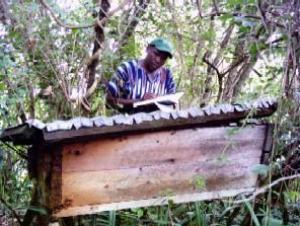Peter Churchill Ogutu
The project will assist local beekeepers to harvest wild honey and increase their incomes, taking care to conserve vital forest resources where bees collect nectar.

Photo shows Peter Chruchill Ogutu assessing the yield in one of traditional Kenya Top Bar Hives owned by KaredFOD Women Group, Nyatike.
With a population of approximately 85,000 people, Nyatike division is one of the mountainous semi-arid regions of Southern Nyanza that still contains natural vegetation and shrubs, which have historically been managed by local communities and is a home to a number of endangered animal and plant species. Recently, however, overgrazing and over-harvesting of natural forests in the area for charcoal, tobacco curing and brick making are some of the common practices that have begun to threaten the area’s biodiversity. Since there are limited income-generating opportunities for the local community who largely depend on subsistence agriculture from unreliable rainfall, these practices are most likely to continue with serious biodiversity degradation.
The project therefore aims to conserve biodiversity in Nyatike division by encouraging local communities to harvest and process wild honey in economically and environmentally sustainable manner.
The purpose is to develop capacity:
1) to create awareness on biodiversity threats and measures to address the same,
2) to implement profitable wild honey processing enterprises,
3) to pioneer, test and prove mechanisms for financing eco-friendly profitable enterprises.